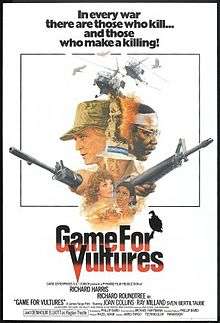Game for Vultures
| Game for Vultures | |
|---|---|
 American poster | |
| Directed by | James Fargo |
| Produced by | Hazel Adair |
| Written by | Philip Baird |
| Based on | a novel by Michael Hartmann |
| Starring |
Richard Harris Richard Roundtree Denholm Elliott Joan Collins |
| Music by |
Tony Duhig Jon Field |
| Cinematography | Alex Thomson |
| Edited by | Peter Tanner |
| Distributed by |
Columbia Pictures Ster-Kinekor Film Distribution Co (South Africa) |
Release dates |
|
Running time | 113 minutes |
| Country | United Kingdom |
| Language | English |
| Budget | $5 million[1] |
Game for Vultures is a 1979 British thriller film starring Richard Harris, Joan Collins and Richard Roundtree. It was directed by James Fargo and based on a novel by Michael Hartmann set during the Rhodesian Bush War.
Plot
It is the late 1970s, and smuggler David Swansey (Richard Harris) specialises in importing goods to war-torn Rhodesia, defying international sanctions imposed on the doomed nation. Swansey is eventually contracted by the Ian Smith administration to arrange an illicit purchase of American-made Iroquois helicopters for counter-insurgency operations against black African nationalists. However, word of his plan soon reaches the latter, who apply strong political pressure to kill the deal in its cradle – the aircraft shipment in question is impounded upon reaching neighbouring South-West Africa.
Meanwhile, one of the many indigenous guerrillas resisting the Rhodesian regime is Gideon Marunga (Roundtree), veteran combatant and reluctant participant in atrocities directed against unarmed civilians by his fellow insurgents. Marunga discovers that Swansey, with the aid of the Rhodesian Special Air Service and South African sympathizers, hopes to lead an armed raid on the airfield where the Iroquois are being temporarily held – with the intention of stealing them across the border into Rhodesia.
On the day of the assault, Marunga arrives at the airfield and stalls the attacking paratroops, while his accomplices succeed in destroying some of the helicopters. In the firefight which ensues he comes face to face with Swansey, and the two men subsequently share a weary moment of reflection on their stalemate. Both abruptly part ways; the smuggler permits his enemy to escape unarmed into the night.
As word of the foiled transaction spreads, Swansey finds himself unable to continue conducting business on the global scale and is restricted to Rhodesia, where he faces conscription into active duty with the security forces. The film's storyline closes as Marunga and Swansey confront each other on the battlefield again – this time through the sights of their rifles.
Cast
- Richard Harris – David Swansey
- Richard Roundtree – Gideon Marunga
- Denholm Elliott – Raglan Thistle
- Joan Collins – Nicolle
- Ray Milland – Colonel Brettle
- Sven-Bertil Taube – Larry Prescott
- Ken Gampu – Sixpence
- Tony Osoba – Daniel "Danny" Batten
- Neil Hallett – Tony Knight
- Mark Singleton – Sir Benjamin Peckover
- Alibe Parsons – Alice Kamore
- Victor Melleney – Mallan
- Jana Cilliers – Ruth Swansey
- John Parsonson – Peter Swansey
- Elaine Proctor – Brigid
- Chris Chittell - McAllister
- Graham Armitage - Harken
- Ndaba Mhlongo – Chowa
- Ian Steadman – Du Preez
- Wilson Dunster – Uffa
- Peter van Dissel – Van Rensburg
Production
Game for Vultures was the first British film about the Rhodesian Bush War.[1]
The film was mostly shot in South Africa, near Pretoria and Johannesburg.[2][3] It was decided not to film in Rhodesia itself because of security concerns and the potential violation of sanctions.[4]
"I'm not a politician", said the producer Hazel Adair. The director James Fargo concurred: "I'm not a political person at all. I never thought about Africa until I started to make a film... The audience will come away with the idea that neither side is right."[5]
"It's a movie in which there are no real bad guys or good guys," said Fargo. "Nobody really wins in the end and everybody loses, like in the real Rhodesia."[1]
During filming in South Africa, Roundtree tried to purchase some liquor but was refused service because of his skin colour.[5]
Soundtrack
The music was composed by Tony Duhig and Jon Field, who together comprised the British group Jade Warrior.
Reception
The film was meant to have its world premiere in Johannesburg on 22 June 1979. However the film was banned by South African government censors, who deemed it a threat to state security.[2]
Though generally well-written and produced, Game for Vultures was not a massive commercial or critical success. Some critics condemned the apparent bias of the plot, which ran counter to the traditionally accepted view of Rhodesia's predominantly white government as being a racially oppressive one, while its black nationalist opponents were widely regarded as freedom fighters representing a just cause.
In addition, this film was overtaken by actual events, as the war came to an end before the film reached wide distribution.[6] It saw some success in video sales, on VHS and in a DVD Region 2 release.
References
- 1 2 3 Filming is education for cast of 'Vultures' Nicholson, William F. Chicago Tribune (1963-Current file) [Chicago, Ill] 28 Oct 1978: n16.
- 1 2 BRIEFLY South Africa bans film The Globe and Mail [Toronto, Ont] 1 June 1979: P.13.
- ↑ THE 'AFRICAN': The Drums Are Beating in them World's Movie Studios for Black and White 'Westerns' Drums Are Beating By Bart Mills. The Washington Post (1974-Current file) [Washington, D.C] 3 June 1979: L1.
- ↑
- 1 2 Filmmakers trek to Africa in search of screen adventures Mills, Bart. Chicago Tribune (1963-Current file) [Chicago, Ill] 17 June 1979: g14.
- ↑ Bishop ushers in new rule The Irish Times (1921-Current File) [Dublin, Ireland] 1 June 1979: 9.